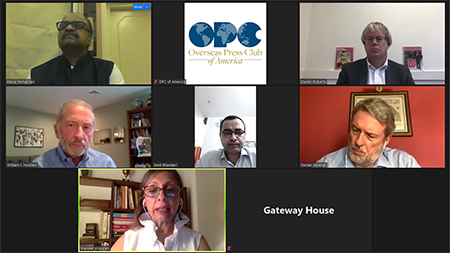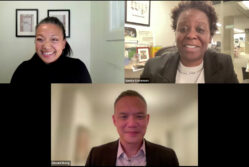Event Coverage Highlight

OPC and Gateway House Host Global Discussion on China Influence

Left to right, top row: Blaise Fernandes, Dexter Roberts; center: William J. Holstein, Amit Bhandari, Declan Kelleher; bottom row: Manjeet Kripalani.
Scroll down to to the bottom of this article watch a playlist of video clips from this program or visit the OPC’s YouTube channel here.
Countries around the world are becoming increasingly concerned about the nature of China’s global advances, a rare global online conversation co-hosted by the Overseas Press Club and Gateway House in Mumbai, India concluded. China, at the urging of President Xi Jinping, is pursuing technological goals and investment programs to build a China-centric global model, not to mention its militarization of the South China Sea and its clampdown on Hong Kong, panelists said during the webinar on Aug. 13.
India has taken a particularly sharp turn in its attitudes toward China, starting with a border incident high in the Himalayas in which 20 Indian servicemen were bludgeoned to death. Then a report by Gateway House showed that 18 out of India’s 30 most promising technology start-ups had taken funding from Chinese-related entities. Moreover, 80 percent of India’s handsets were made by Chinese entities, and TikTok and other Chinese applications had grown very popular, the report said.
The Gateway House report is available to read in full here.
Gateway House researchers concluded Chinese companies were sending data from this foothold back to China, where it could possibly be “mined” for names and personal information of prominent Indians. China developed a strong presence in India’s relatively open media sector, sending anti-Indian programming to millions of viewers and listeners. India’s government responded by shutting down some 60 Chinese software applications, including TikTok.
Panelists included Manjeet Kripalani, founder and executive director of Gateway House, as well as Blaise Fernandes and Amit Bhandari, who co-authored the report on China’s presence in India.
From the United States, appearing was Dexter Roberts, author of The Myth of Chinese Capitalism: The Worker, the Factory and the Future of the World, a fellow at the Mansfield Center and nonresident senior fellow at the Atlantic Council’s Asia Security Initiative; and William J. Holstein, OPC Past President and board member, and author of The New Art of War: China’s Deep Strategy Inside the United States, who moderated.
From Dublin, Ireland, Declan Kelleher, former Permanent Representative of Ireland to the European Union; and former Ambassador of Ireland to China, rounded out the lineup of speakers.
Fernandes said that China was building a “Digital Silk Road” to complement its Belt and Road Initiative, which stretches from China through South Asia and Africa into ports in Greece and Italy, currently under construction. He argued that Huawei’s 5G wireless communications system was essential to building the Digital Silk Road which is key to the Chinese government’s efforts to bring 600 million mostly rural Chinese up to the same living standards as urbanites. Beijing hopes that data communicated back to China will help ensure the success of its Made in China 2025 plan to dominate key technologies and products on a global basis.
“The Digital Silk Road is the flag bearer for ‘Made in China 2025,’ because it will send them the data that will make those products competitive,” Fernandes said, adding that this plan has taken a hit after India put a “pause” on China’s strategic use of apps like TikTok. “The Internet is now virtually the ‘Splinternet.’ You have China on one side and the rest of the world on the other side, the rest of the world sort of bifurcating, Europe going their own way, America going their own way, and probably India showing the way, showing their own powers.”
Bhandari shared his expertise on how Xi Jinping has used the Belt and Road Initiative (BRI) to encircle India with projects in seven countries surrounding India, particularly Pakistan and Sri Lanka. He said the pattern of the projects exceeded what any commercial purpose would justify, forcing governments to incur greater debt to pay for them and pay interest rates well above international norms. The end result of these “debt traps” was a dependency on Beijing and other concessionary steps, such as ceding control of a port in Sri Lanka to the Chinese for 99 years.
“There were padded costs” in these debt-trap projects, Bhandari said. “Power projects which were being done in Pakistan were anywhere from 20 to 50 percent costlier than similar projects being done in India.”
Ambassador Kelleher explained how European governments are agonizing about whether to embrace Huawei’s 5G systems. They are caught in a crossfire between the Trump administration pressuring them not to do so and a Chinese government which is publicly warning that there will be “consequences” for their economic ties in China if they do not.
Kelleher said when the European Union outlined tougher policies on China relations in March last year, on issues including human rights, emissions and trade, the body also decided that member states would work in concert on 5G.
“And just a few weeks later, unveiled this new approach at an EU-China summit in April 2019. And I think it’s fair to say the China side were quite surprised the the EU were now adopting a granular, fairly assertive and objective-oriented approach.”
Holstein described the pattern of Chinese expansion as experienced in the United States. “Chinese government-related entities have deeply penetrated our computing systems, including our supposedly advanced cloud computing systems,” he said. “They have stolen, and continue to steal, millions of pieces of data about Americans and their finances and health, and they continue to siphon out technology.” FBI Director Christopher Wray said recently that his agency is opening a new investigation into China’s alleged theft of Intellectual Property every 10 hours.
Roberts said it appeared that President Xi was calculating that he could take steps, such as imposing a draconian new security law on Hong Kong, at this time because there would not be an effective global response. China also dispatched jet fighters into disputed air space near Taiwan to protest the visit of U.S. Health and Human Services Secretary Alex Azar, another demonstration of Xi’s determination to project power.
“But even before the health secretary got there, we’ve seen consistent flights by the Chinese Air Force across that unofficial line. We’ve seen clashes in the Senkaku Islands near Japan, we’ve seen clashed in the South China Sea with Vietnam, and the list goes on.”
Holstein asked the panelists what could be done to counter China’s sometimes heavy-handed global expansion. Fernandes said the Digital Silk Road represented the “Achilles’ heel” of China’s expansion efforts. If it can be halted by other nations that refuse to cooperate, “this vulnerability will bring China to the negotiating table. China could not be an outlier anymore,” he said.
Kripalani said it was important to ramp up an embryonic so-called “Quad,” or alliance, among Australia, the United States, Japan and India. She called for reform among global institutions, saying that most of them established at Bretton Woods in 1945 “benefit developed countries, but really it’s very hard for smaller underdeveloped countries to participate.”
Kripalani also said stronger U.S.-Indian ties would be crucial. “We’re ready to get married to each other,” she said. “It’s been too long that [India] has taken a back seat in this bilateral. The people-to-people relationship has been so robust that it covers up the lack of institutional engagement,” Kripalani said, adding that “these two big, great democracies need set the right example.”
Kelleher agreed that the multilateral organizations dating from the end of World War 2 needed reform, and very diplomatically expressed hope that after November’s elections, the United States might refocus efforts on multilateral approaches with its European and other partners and allies.
Roberts agreed that the United States has to shift its policy of provoking its allies into one that will engage them in a pattern of cooperation to counter China. “We can’t do it alone,” he said.



